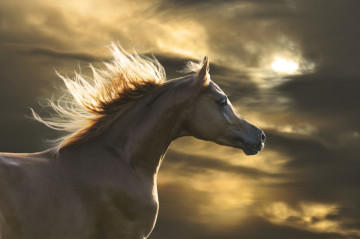 There are still three spaces left in the upcoming Eponaquest Apprenticeship Program starting in October. This longstanding, multi-week, multi-disciplinary facilitator training is offered only once a year to a small group of applicants.
There are still three spaces left in the upcoming Eponaquest Apprenticeship Program starting in October. This longstanding, multi-week, multi-disciplinary facilitator training is offered only once a year to a small group of applicants.
Established in 1993 by internationally recognized author, educator, and horse trainer Linda Kohanov and counselor/coach Kathleen Barry Ingram, MA, the program has since expanded in scope to become one of the most the most innovative, in-depth facilitator trainings in the fields of Equine-Facilitated Learning, Equine-Facilitated Leadership Training, and Equine-Facilitated Psychotherapy. As of 2016, over 280 Eponaquest Instructors on five continents have graduated from the program.
The Eponaquest Apprenticeship Program comprises 256 hours of direct, in person study with Linda Kohanov and the Eponaquest faculty, with an average of 30 additional hours of conference calls and online assistance in workshop preparation skills and professional support, as well as ongoing continuing education opportunities that keep instructors up to date with the latest innovations.
“Over the last year, we have added two new faculty members to our staff,” founder Linda Kohanov reports. “Susan Crimmins, PhD, has degrees in social work and criminology. She has taught at the university level, and has studied the latest techniques in trauma recovery. Charlotte Richardson is a pioneer in bringing the Eponaquest Approach into the public school system where she teaches our horse-inspired leadership, emotional and social intelligence skills in the classroom five days a week, with monthly trips to the barn. Along with advanced instructors Elysa Ginsburg and Sue Smades, who have both co-facilitated close to a hundred workshops with me over the last eight years, we have a dedicated faculty that bring individual talents, experience, and expertise to the Eponaquest Apprenticeship Program.”
A “Life Changing” Professional Training
As Juli Lynch, Ph.D., President of Turning Pointe Coaching and Consulting, reports:
Completing Eponaquest’s Apprenticeship Program has proven to be of value beyond my initial expectations. I completed the apprenticeship in 2006 and today have a thriving equine facilitated coaching practice. In the years since Linda began training instructors in the Eponaquest approach, numerous other equine facilitated learning organizations have sprung up with the intention of training facilitators in this rapidly growing field. Some have even attempted to replicate Eponaquest. However, Linda Kohanov’s program has stood the test of time, and in my opinion, is the Gold standard by which all other training program should be compared.
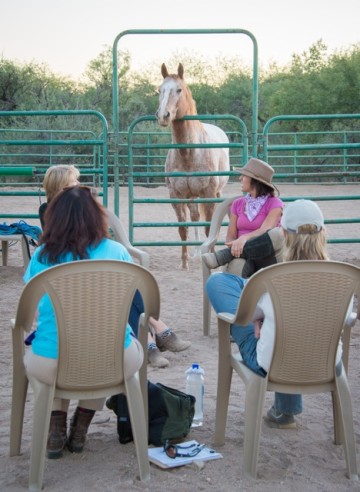
As the Eponaquest Apprenticeship Program celebrates its 14th anniversary with the graduation of this upcoming class, an increasing number of facilitator-training programs have been developed in North America, Europe, and Australia over the last decade. “There is some valuable cross-pollination in the field with graduates of various programs studying multiple techniques,” Linda observes. “We certainly support the inclination to learn and incorporate different approaches to create a unique practice. Increasingly, we find that graduates of other facilitator trainings have decided to go through our program not just to deepen and expand their skills, but to add our extensive, time-tested, copyrighted activities, workshop formats, and educational materials to their toolboxes. We offer credit for professional experience and training in other programs as fulfilling some pre-requisites for entering the Eponaquest Apprenticeship, and in very specific cases, for entering an accelerated training. For those who are new to the field, our multi-week program, combined with pre-requisites (and internships in some cases) help students develop the horse and human-facilitation skills to start a multi-faceted practice immediately upon graduation.”
“This apprenticeship changed my life, improving my skills and ability to help both humans and horses,” says Cathryn Clerc, who specializes in equine-facilitated personal development programs as well as transformational approaches to leadership training. “The same skills I teach, I strive to embody in my personal life, and I am fortunate to love what I do for a career.
“I researched several other programs and teachers prior to settling on the 2006 Eponaquest Apprenticeship. Since then, as part of my ongoing mission to improve my facilitation skills, I regularly seek opportunities to learn from others in the equine-facilitated learning field. I am always left with the awareness that the Eponaquest Apprenticeship stands alone in its comprehensive teachings. These teachings are ground breaking, and year after year Linda continues to produce new bodies of work that keep her apprentices in the forefront of this field.”
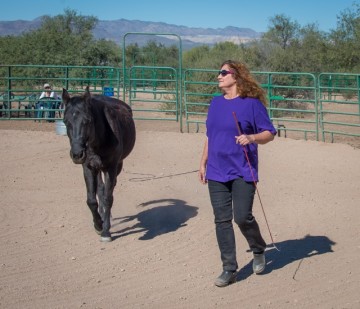
Study with a Major Innovator in the Field
Linda Kohanov’s 2001 best-seller The Tao of Equus was one of the first books to explore, research, and reveal the healing potential of the horse-human bond. Her subsequent books, including Riding between the Worlds (2003), and Way of the Horse: Equine Archetypes for Self Discovery (2007) have been translated into French, German, Dutch, and most recently the Czech language. Her 2013 volume, The Power of the Herd (2013), has already been released in French and Dutch, and has achieved notoriety as a textbook in universities, therapeutic practices, and corporate leadership programs. It’s even used in continuing education seminars for other facilitator trainings unrelated to Eponaquest (including EAGALA and PATH-based programs as well as several equine-facilitated coaching programs). However, only those facilitators who study directly with Linda Kohanov and graduate from post-2012 Eponaquest Apprenticeship Programs (or the Power of the Herd Continuing Education seminars for previous Eponaquest graduates) carry an official endorsement from the creator of this innovative model and are featured as Recommended Instructors with the “POH” designation on the Eponaquest Worldwide website.
“While I’m pleased to see that so many people have embraced The Power of the Herd and are incorporating the 12 Guiding Principles into their own practices,” Linda says, “there are very specific horse-facilitated activities, indoor experiential activities, and phone consultation techniques that go along with the text that I simply could not include in the book. They must be taught in person.”
Linda’s new book The Five Roles of a Master Herder has taken this work to a whole new level in 2016 and has been embraced by a larger audience than ever. Actor, director and author William Shatner calls this model “an innovative and practical nature-based approach to leadership — and life. [It’s] not just for corporate executives. Parents, teachers, community organizers, film directors, and especially politicians would all benefit from learning these skills.”
A Flexible Practice
The Eponaquest Apprenticeship Program teaches how to use the tools, horse-facilitated activities, lecture materials, POH Guiding Principles and the Master Herder model in many different settings. “This helps graduates develop a flexible practice that really keeps things interesting,” Linda emphasizes. “It allows you to take advantage of unexpected opportunities in your community, and it helps your clients to learn how to take horse wisdom back to the human world.
“With this in mind, the apprenticeship offers formats, copyrighted power point presentations, handouts, and human-to human experiential activities for doing indoor seminars and consultations. This allows you to reach out to organizations that are either still a bit skeptical of the horse-facilitated work or don’t currently have the budget for it. On-site trainings in businesses, schools, non-profits, community organizations, churches, and social service agencies expand your client base—and keep your horses from having to carry the full teaching load.”
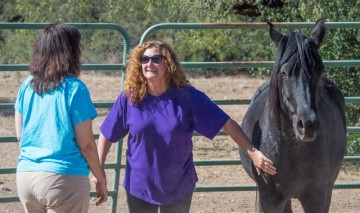
Linda also emphasizes how to develop long-term associations with clients through weekly horse-facilitated sessions, advanced workshops, and/or phone consultations that support clients in mastering the 12 Power of the Herd Guiding Principles and The Five Roles of a Master Herder skills after they leave the barn.
“I am a clinical social worker with a specialty in relationship and professional development counseling,” says Sarah Janosik, who graduated in 2005 and returned in 2014 to become an Advanced Instructor. “This approach to equine facilitated learning is a unique and powerful process. I have used this method to teach people effective skills in relationships, either personal or business, through working with horses. I love this work and continue to learn new skills that help me and my clients change.
“Linda has the ability to integrate science, history, psychology, spirituality, and business theory and provide the practical knowledge that people need to make changes. In this process, the horses are teachers, not props or a team exercise. This work is as transformative for individuals in personal relationships as it is for leaders in organizations and professional practices.
“Eponaquest is sophisticated and research oriented as well as practical. Regardless if I am working with individuals or business teams, conservative or liberal individuals, this approach works. It provides the information people need to understand why developing new skills is necessary in this changing world—and practical ways to learn them.”
As a longstanding proponent of equine-facilitated learning and therapeutic modalities, Linda has researched and written about a variety of facilitator training programs over the years. She also chronicled the early history of this field in The Tao of Equus. “I’m pleased to see that a number of the newer programs teach some engaging and effective equine-facilitated activities as well,” she says. “I’m continually inspired by the innovative and imaginative people attracted to this field, people who embrace the additional responsibility of becoming leaders in the field.”
However, no other equine-facilitated learning program offers so many tools, skills, and presentation materials for helping clients to take “horse wisdom” back to the human world. The Eponaquest Apprenticeship Program has further distinguished itself as a continually evolving, hands on training developed through five internationally respected books, and the extensive research and experience it took to write them.
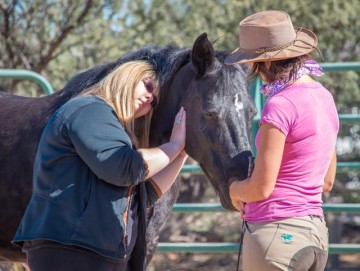
“I have found that the addition of the Power of the Herd and Master Herder programs to my Eponaquest body of knowledge has not only enhanced my work as an equine facilitated coach but also my work as a life coach, executive coach and organizational consultant, where often it is not possible to interact with horses in order to teach the concepts,” says Juli Lynch, Ph.D., an organization development specialist, author, and Eponaquest Advanced Instructor.
“In particular, I’ve taken these concepts, materials and activities into my work as an organizational and management consultant in the banking industry. The response has been extremely positive. POH concepts have assisted board members, executives, managers and front line staff to learn to thrive in the highly regulated and competitive world of banking where small, family-owned community banks are literally running for their lives as the predatory big banks trounce on them in an effort to acquire and consolidate the industry. By assisting these organizations in building their cultures around the POH 12 Guiding Principles, concepts such as developing assertiveness, engaging creatively, addressing conflict, and using emotion as a tool for awareness before action, my clients and I have seen positive culture shifts and bottom-line improvements that stand as testimony alone to the power of the POH.”
Program Format
Four in-person trainings spread out over six months allow students time to practice and integrate new material in between each nine-day seminar. Graduates leave the program with the confidence attained from working directly with clients. As part of the training, apprentices prepare and facilitate a one-day workshop and a two-day workshop under the support and direction of the Eponaquest Faculty.
There is some flexibility to the program. Apprentices graduate at the end of the third session as Eponaquest/POH Instructors who are also certified to offer the Five Roles of a Master Herder in educational, personal development, and corporate contexts.
During the optional fourth week, new graduates learn additional horse skills that build on the core Eponaquest tools, including how to teach horse rescue volunteers and other equestrians innovative strategies for working safely with “problem horses.” Other advanced facilitation techniques include expressive arts, music, transformational storytelling, and intuition/creativity-building experiences. Instructors practice Eponaquest’s unique process for leading guided visualizations such as “Becoming the Horse” and “Harnessing the Invisible” to help clients develop an effective balance between a logical, practical, grounded form of consciousness, and an intuitive, imaginative, innovative form of consciousness that inspires leaps in understanding, integration, and transformation.
The fourth week also offers a sequence of activities and tools used in the Connection Focused Therapy (CFT) model that Linda developed with author, psychologist and family reunification expert Dr. Rebecca Bailey. (Dr. Bailey, co-author of the book Safe Kids: Smart Parents, is a frequent expert commentator on national news programs, and is best known as the therapist who helped Jaycee Dugard recover from the long-term abuse of an 18-year kidnapping ordeal.) Those Eponaquest Instructors who are licensed mental health professionals are thereafter authorized to employ this model. Equine-facilitated learning practitioners who would like to expand their practices into the mental health field are taught how to use CFT in collaboration with a licensed mental health professional.
“One of the things I value most about the Eponaquest Apprenticeship is the innovative approach to addressing mental health and residual trauma issues by embracing a comprehensive balance of science, arts and spirituality through the way of the horse,” says Susan Crimmins, Ph.D., a trauma specialist and retired professor of criminology and social work who has created an integrative educational and therapeutic practice, in addition to her Eponaquest Faculty position.
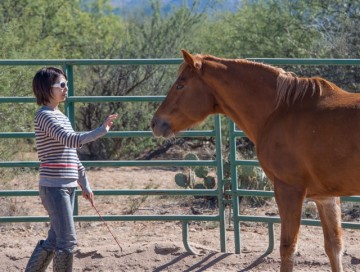
“What sets Eponaquest light years apart from other equine programs is Linda’s ability to ground her teachings within historical contexts and well researched scientific frameworks that come alive through interactive experiences, while, first and foremost, honoring the professorial gifts of the horse. In a substantive and savvy curriculum, apprentices are exposed to multi-layered principles and practices, which include the tenets of social and emotional intelligence, as well as how to model and integrate these skills in the world at large.
“This apprenticeship program doesn’t just teach horse skills; it teaches life skills to be brought forward in healing horses and humanity—a remarkable gift.”
The Latest Innovation
Starting in 2013, apprentices also began receiving instruction in how to teach The Five Roles of a Master Herder in corporate, educational, personal development, equestrian, and family systems contexts. This model, based on research Linda first presented in The Power of the Herd, has since expanded into her latest book, just release in June 2016.
The Five Roles of a Master Herder offers a potent, deceptively simple way to understand—and transform—group behavior. Equestrians from amateur riders to professional trainers to horse rescue personnel have benefitted from understanding this model and the accompanying experiential techniques, as have people who work in the equine-facilitated human development, therapy, and leadership training fields.
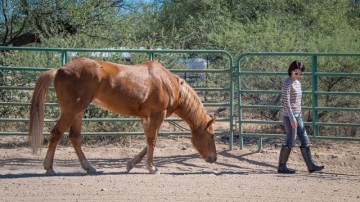
“The Five Roles are based on studies of traditional herding cultures and experiences with my own herd of horses,” Linda reveals. “Pastoral tribes travel vast distances through changing climates. Along the way, they meet up with different cultures, facing both two and four-legged predators at times. Even so, they manage to keep the herd and the tribe together without fences and very little use of restraints, relying instead on a sophisticated understanding of instinctual group dynamics, mutual aid, and interspecies socialization.
“Experienced herders in these cultures learn to employ five different leadership roles as needed, and I mean that each herder knows when and how to use all five, rather than specialize in one or two. These roles are the Leader, the Dominant, the Sentinel, the Nurturer/Companion, and the Predator. In our sedentary culture, most people—even accomplished equestrians—have lost this knowledge. Few people realize that in herds of freely roaming herbivores, the Leader and the Dominant are often two different animals, that they perform specific functions essential to the group’s well being, and that the other roles I mentioned also contribute to the healthy functioning of a herd.”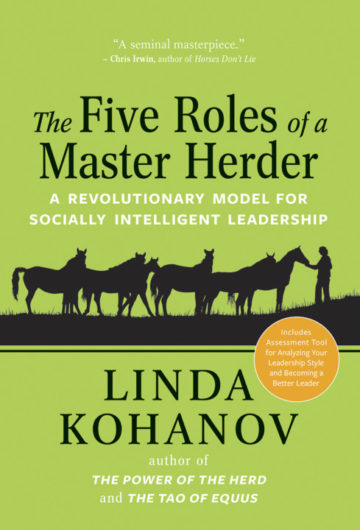
The Five Roles of a Master Herder, which was published in June 2016, had already created a stir internationally months before: Eponaquest POH Instructors have been employing this model in equine-facilitated workshops, in private coaching and counseling sessions, and in larger indoor lectures/seminars.
In Paris, Linda was asked to present the Master Herder power point to a multi-lingual audience of entrepreneurs and business students at the Executive MBA Program “Leading Innovation in a Digital World” de l’Institut Mines-Telecom. Didier Tranchier, head of this international program, wrote that a two-hour presentation on this nature-based model “changed my life and the life of everyone in the conference room that night. Explaining the differences between a dominant and a leader, and the usefulness of predatory power when balanced with nonpredatory power were real insights to understand how companies are working and how we can improve our efficiency. With very simple words and great examples coming from the world of horses and traditional herding cultures, Linda explained the power of groups and how to build relationships that can enable any individual, even a child, to steer and leverage large and powerful organizations.”
Therapists and educators also find the model useful. “Linda has pioneered an innovative approach to understanding human behaviors in groups,” says author, psychologist and family reunification expert Dr. Rebecca Bailey. “Her insights are applicable to a wide variety of populations. By understanding the unconscious, often purely instinctual power plays in human relationships and nature, she is helping people shift old power patterns to be more effective in all their relationships. Corporations, educators, families and individuals will benefit from looking at themselves from this life altering perspective.”
The book also includes an assessment tool for people to learn which roles they are talented at (and tend to over-emphasize) and which roles they ignore or actively avoid. This assessment helps people understand how they use, or misuse, these various roles in their professional lives as well as in their personal lives. “What we have found in testing this material over the last three years,” Linda reports, “is that people sometimes overemphasize certain roles at work, while engaging in the habitual, yet still dysfunctional, overuse of other roles with family and friends,” Linda says. “Learning how to balance all five roles at home, school, work, and in larger community settings is key to experiencing greater harmony, effectiveness, and joy in all aspects of your life.”
Members of the Apprenticeship Program receive training in how to use the assessment tool in leadership, personal development, and family systems contexts. They also learn how to teach the Five Roles to individuals and groups, adults and children.
“One of our apprenticeship faculty members, Charlotte Richardson-Zwald, is teaching a modified version of the Master Herder skills to a seventh-grade special ed class,” Linda reports, “and the results of the program’s first year were impressive. The students were not only receptive to the daily classroom work and monthly trips to the barn, they were enraptured with this material. I’m excited to see how this program progresses in fall 2016 as the school continues to support students studying the Eponaquest tools five days a week!”
Requirements and Application Process
For a list of requirements and application for the 2016-17 Eponaquest Apprenticeship Program, please see
http://eponaquest.com/prerequisites-application-process/
For exact dates and costs:
http://eponaquest.com/upcoming-program-specifics/
Linda is willing to consider graduation from other facilitator training programs, or solid experience in an already-established equine-facilitated practice, as fulfilling one of the advanced workshop requirements for entering the Eponaquest Apprenticeship Program.
For those with more extensive experience and training in the field, there is a by-invitation-only option to apply to an accelerated two-week apprenticeship in the Master Herder model only. For more information on this specialized option and whether or not you qualify, contact info@eponaquest.com with a brief overview of your experience and training in the field.
“The field has expanded dramatically in the last decade,” Linda says. “People who have learned other methods and/or have graduated from university programs that now teach equine-facilitated activities are often interested expanding their practices with the Eponaquest, POH, Master Herder, and Connection Focused Therapy techniques. We are so happy and enriched to have people experienced in multiple approaches go through our program. And we support all of our graduates in further developing their unique talents, and eventually adding their own innovations to this limitless field while building on the basic Eponaquest/POH principles and activities.”
“I believe part of Eponaquest’s exceptional program is due to its pursuit of continually researching, developing, testing and updating the Eponaquest curriculum for instructors,” Juli Lynch concludes. “As the creator and author of this body of work, Linda has an intimate and in-depth relationship with the material that nobody else can offer. It is easy to pick up a book that is about the field of equine assisted coaching or therapy, or attend a weekend seminar about equine facilitated coaching or therapy and assume, as a coach, therapist or consultant that you’ve captured the underlying concepts well enough to bring them to your clients. Consider, however, what it would be like to embark on a deeper journey into the heart, soul and passion of this emerging profession supported by the brilliance of the Eponaquest Team. I encourage you to consider becoming an Eponaquest Instructor. It could be an experience beyond what you ever thought possible.”
For more information on the history and development of the Eponaquest Apprenticeship Program, see an extended version of the information presented in this newsletter at http://eponaquest.com/overview/